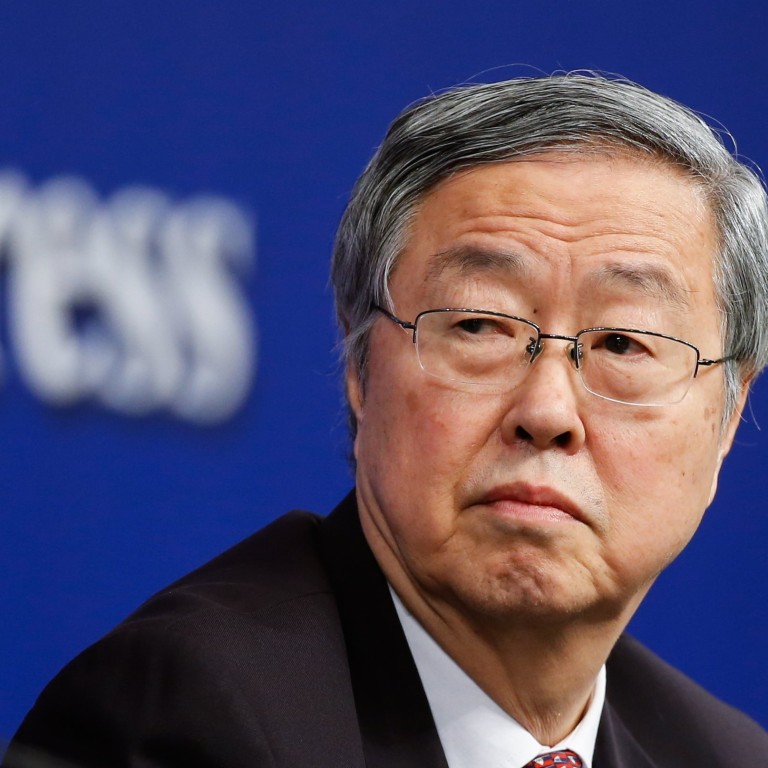
China’s former central bank head urges greater central bank coordination to prepare for future crises
- Zhou Xiaochuan, a former governor of China’s central bank, says the need for greater policy coordination among central banks is rising
- Global central banks need new mechanism to tackle economic problems ranging from aggressive US rate cuts to capital flow concerns, Zhou says
China should push for greater international coordination to deal with the effects of US rate cuts, capital flow concerns and structural weak points in global financial regulation that have been exposed by Facebook’s Libra, a former governor of China’s central bank said on Friday.
“The need for policy coordination among central banks is rising,” Zhou told the Caixin Summit at the Diaoyutai State Guesthouse in Beijing.
Due to trade friction and a variety of other problems, there is much distrust between China and the United States. Multilateralism is now challenged and going downhill
Although central banks are divided on whether a new financial crisis is imminent, Zhou insisted there was a need to prepare, saying that the unilateralism had already undermined the foundation of collaboration, which was vital to battling the 2008 financial crisis.
“Due to trade friction and a variety of other problems, there is much distrust between China and the United States,” Zhou said. “Multilateralism is now challenged and going downhill.”
Zhou did not specify what a new global coordination mechanism would look like, but China – now the world’s second largest economy – would have a bigger say.
The remarks reiterate recent calls from the Chinese government for the advancement of free trade and globalisation in the face of US President Donald Trump’s “America First” principle that has dampened global trade and investment.
“Some might say there is already a framework for central banks to enhance policy coordination. But I think there’s actually not,” he said, hinting at the limits of the Bretton Woods system, including the International Monetary Fund (IMF), the World Bank and the World Trade Organisation.
Although the Bank for International Settlements provides an additional platform for global central bankers to discuss mutual concerns, the Switzerland-based institution lacks authorisation for policy coordination and enforcement, Zhou said. The annual Group of 20 summit, meanwhile, was more focused on financial stability and did not touch monetary policy or financial infrastructure.
Zhou, a prominent reformist-minded official active in Beijing’s policymaking circles since the 1980s, helped revamp China’s technically bankrupt state banking system, push forward interest rate liberalisation, and build the framework for a modern central banking system. He was dubbed as “Mr. Renminbi” for his contribution to internationalise the Chinese currency 10 years ago and promote it as an international reserve currency.
Beijing has since gone on to flex its economic muscle and show its commitment to multilateralism through the Belt and Road Initiative and the Asia Infrastructure Investment Bank.
“It [yuan internationalisation] was a premature infant as a result of the global financial crisis,” he said. “Its development will be a gradual process.”
In their testimony to the US Congress or official speeches, the Fed stated clearly that it is only responsible for US concerns, not global issues
However, there would be a chance of growth if countries that held US dollar reserves fell into trouble or US financial sanctions lead to de-dollarisation, Zhou added.
One area that could benefit from greater policy coordination would be dampening the impacts of aggressive rate cuts – especially from the US Federal Reserve – on other economies.
US monetary officials have cut interest rates three times this year, while Trump has called for even more aggressive easing to boost economic growth.
“In their testimony to the US Congress or official speeches, the Fed stated clearly that it is only responsible for US concerns, not global issues,” Zhou said.
China has so far refrained from any aggressive easing, but the People’s Bank of China (PBOC) earlier this week cut the one-year rate on its medium-term lending facility (MLF), the rate at which it lends to banks at relatively low cost, by 5 basis points to 3.25 per cent, the first reduction since February 2016. The move raised market expectations of more easing to prop up China’s slowing economy.
Facebook announced in June that it would launch its digital currency backed by a basket of freely convertible currencies, but not including the yuan. The proposal has faced scepticism from global central banks and regulators, who fear it could disrupt the global financial system and undermine monetary sovereignty.
Still, Zhou said the using Libra for cross-border remittance was “reasonable” and “attractive”, given the high cost and low efficiency of existing services.
The PBOC has been tight-lipped when it will launch its sovereign digital currency, which will be centralised and used mainly for wholesale and electronic payment.

